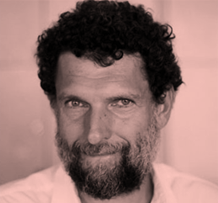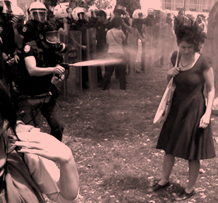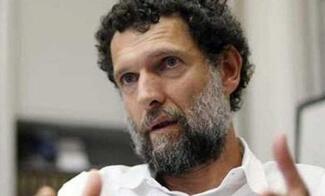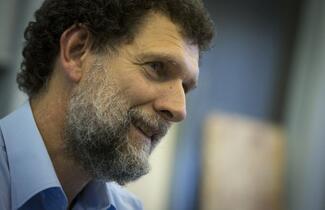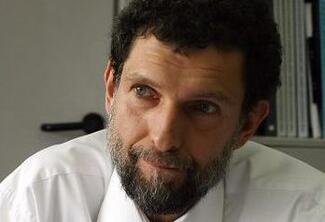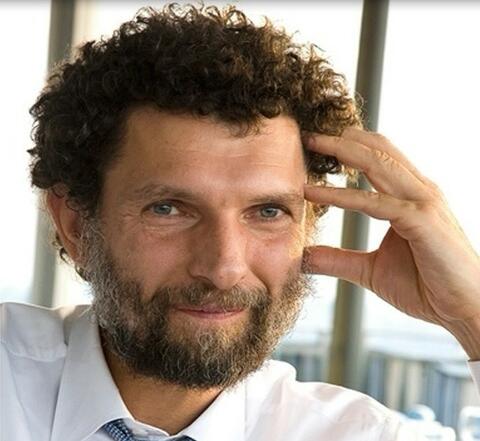
This case is of grave importance — not just on an individual level but for the future of rule of law and human rights in Turkey and across Europe.
Başak Çalı and Philip Leach are representing Osman Kavala at the European Court of Human Rights.
When war, geopolitics, energy squeezes and inflation take center stage on the Continent, is there a risk of human rights and rule of law being forgotten? In such a context, does the credibility of the European Court of Human Rights (ECHR) and the fate of one wrongly imprisoned man really matter?
As human rights lawyers, we fervently believe that they do. And as legal representatives of 65-year-old political prisoner Osman Kavala, we know that what’s happening to him in a prison outside Istanbul is of the gravest importance — not just to him and his family, but for the future of rule of law and human rights in Turkey and across Europe.
Kavala is a successful businessman, civil society activist and human rights defender, who works in art, culture, the environment, and on collective memory. And this week marks his fifth year behind bars, as he now faces life imprisonment.
He was first arrested in October 2017, during a political crackdown on government critics. He was accused — in an unintelligible indictment — of attempting to overthrow the government, and even the constitutional order, in connection with the countrywide Gezi park protests, which had erupted four years prior, and the failed coup in 2016.
Two years after his initial detention, in December 2019, the ECHR reviewed all the accusations against Kavala, and finding not a single piece of evidence that supported the charges, the Court called for his immediate release. It concluded that the case against him amounted to the criminalization of basic rights, such as peaceful protest and freedom of expression, and that it was evidently a bid “to reduce him to silence as an NGO activist and human-rights defender” — as well as dissuade others in Turkey from carrying out similar work.
But he never made it to freedom.
In a move the Court described as a “circumvention of the law,” Kavala was released twice, only to be immediately rearrested without seeing the light of day, even though no new evidence has ever been offered.
Then, in April of this year, a local Istanbul court convicted him and sentenced him to aggravated life imprisonment in relation to the Gezi Park protests, despite the ECHR’s conclusion that there wasn’t enough evidence to even arrest him, let alone convict. At the same time, seven equally innocent co-defendants — civil society activists, architects, lawyers, scholars and filmmakers — were sentenced to 18 years each for helping him.
However, in a historic decision made this July, the Grand Chamber of the European Court of Human Rights found against Turkey once more. The Court said that, in essence, nothing had changed since it last reviewed his case, and Kavala must therefore be released.
Beyond the devastating personal impact on both him and his family, Kavala’s case has now become a litmus test of Turkey’s standing in Europe. Ankara’s ongoing refusal to implement not one but two ECHR rulings to release a human rights defender who is unlawfully detained, has put the country on a collision course with the remaining 45 members of the Council of Europe, which need to maintain the authority and legitimacy of the Court and its judgments.
The case is also a critical test for the future of Europe’s human rights institutions, which were rocked by Russia’s expulsion from the Council of Europe in March, following its invasion of Ukraine.
Meanwhile, the Court is again facing challenges from the United Kingdom, where new Prime Minister Liz Truss has ominously already called for powers to override the ECHR, and former Home Secretary Suella Braverman has spoken out in support of Britain leaving the the Court altogether — where it would be joining the company of Russia and Belarus.
At its September meeting reviewing Kavala’s case, the Council of Europe’s Committee of Ministers warned that his release was needed in order “to maintain the authority of the Court and the Convention system.” But neither two major court judgments nor high level diplomacy is yet to succeed in solving either the legal or the political impasse in Turkey.
For now, the spotlight falls on the judges in Turkey who will review Kavala’s continuing detention and conviction — they are the ones who have the obligation to secure his release. And for Turkish judges, being brave enough to free Osman Kavala would not only represent a beacon of hope for the country, but it would also help renew a sense of optimism across Europe in an era of war, loss and displacement.
